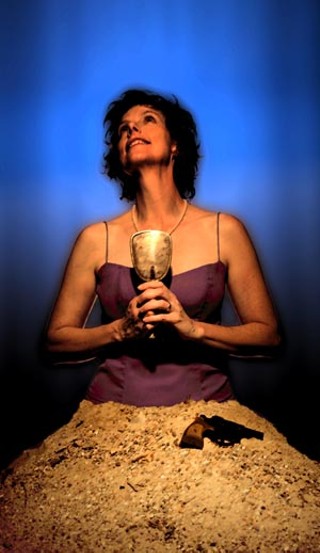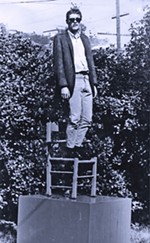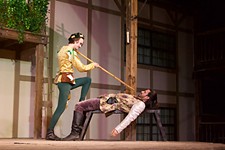Happy Days
With standout work by Katherine Catmull, Beckett's 'happy' play gets a revival to be grateful for
Reviewed by Robert Faires, Fri., Oct. 12, 2007

Happy Days
Hyde Park Theatre, through Oct. 20
Running time: 1 hr, 50 min
When you see someone who's endeavoring to read a line of print in criminally small type take the arm in which the offending text is held and, to compensate for fading vision, extend it as far as it can go, you're witnessing a rite of middle age so commonplace as to be good for a knowing chuckle. And yet, when that person is buried waist-deep in the earth, as is Winnie, the heroine of Samuel Beckett's Happy Days, the humor of where we are in life is darkly shaded by our recognition of where we're headed: the grave every one of us is sinking into.
This may well be the most "upbeat" of Beckett's plays, but it's every bit as existential, as focused on death and on life as something we endure as we progress inexorably toward our ultimate fate, as any of his bleaker works. The spot where Beckett has planted Winnie might be just down the road from the wasteland where Didi and Gogo while away the hours waiting for Godot; it's a blighted landscape so devoid of life that the appearance of a lone ant provokes considerable attention from Winnie, who mostly busies herself with daily routines – brushing her teeth, brushing her hair, donning her hat, singing a song – to pass the time between the "bell for waking and the bell for sleep." Immobile beneath a blistering sun that never sets, she suffers a soul-crushing existence, yet Winnie steadfastly refuses to bow under it. She adheres to her rituals, drawing deep pleasure and, it seems, solace from the most mundane of activities and continually dismissing her dismal situation with a shrug and the line, "Can't be helped." Even though the large bag containing all her possessions holds a revolver (affectionately dubbed "Brownie," like a pet) and she could presumably use it to "help" herself out of her misery, she chooses to go on, accepting her bizarre plight and ever seeking a positive perspective on events. That is the wonder of Winnie. She not only never gives in to despair; she never gives it a thought. No matter how brutal and barren life is, she seeks out and focuses on the good in it. She considers it a "happy day" when she can get a word – not a good word, mind, just a word – from her tight-lipped, spectacularly unresponsive spouse, Willie, who holes up in a small cave behind her. In the second act, when Beckett has sunk her in earth up to her neck, when she's no longer able to perform most of her beloved routines, when the bell for waking gratingly, sadistically jangles whenever she closes her eyes, when her nerves have frayed and finding the gold amidst the dross requires so much more effort, when the light in her eyes dims and we can glimpse a terror there, Winnie still manages to sing – yes, sing. Of love. You sense that even Beckett, who threw all this at the poor woman, is in awe of her.
As Austin sees precious little Beckett nowadays, we're grateful to Capital T Theatre and director Mark Pickell for staging this play. We're even more grateful, however, for his enlisting the services of Katherine Catmull to portray Winnie. She's an actress of intelligence and curiosity, well-suited to probing the corners of Beckett's simple yet enigmatic text, which she does, skillfully, etching vivid impressions of Winnie's past, her prickly relationship with Willie (a suitably stolid Mick D'arcy), and her many shifting moods. She also has the experience to know both the indignities of age with which Winnie must cope and not to condescend to her for her unfailing optimism. You can't comment on Winnie and make her live. Catmull crawls inside that mound of earth with her and is true to Winnie in all her nostalgia, all her concern for and impatience with Willie, all her desire, all her fear, and, crucially, all her hope.
Whether you find Winnie admirable or foolish may depend upon your age, upon how far you feel yourself sunk into the earth. But she is worth the attention of us all, to show us how, in the merciless grip of this world, it's still possible to sing.










